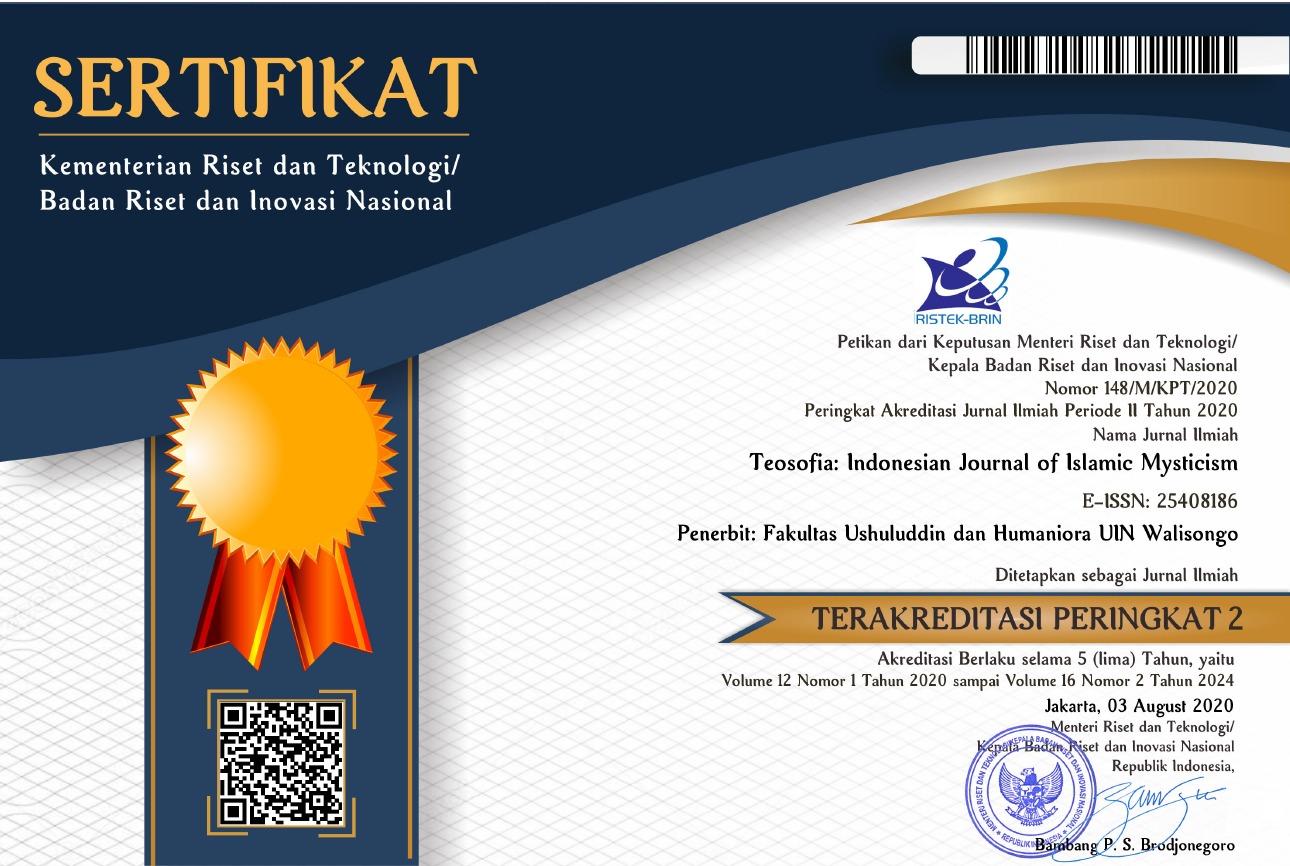Tazkiyat Al-Nafs as Resilience Strategy to Deal with the Post-Pandemic Recession among Micro, Small, and Medium Enterprises (MSMEs) Actors
DOI:
https://doi.org/10.21580/tos.v12i1.14437Keywords:
Tazkiyat al-nafs, religious resilience, recession post-Pandemic, micro, small, and medium enterprises (MSMEs)Abstract
This paper examines how resilience religiosity using the tazkiyat al-nafs technique is carried out by economic actors from the elements of Micro, Small, and Medium Enterprises (MSMEs) facing a post-pandemic recession. In-depth interviews were conducted with 27 MSME actors. The findings reveal that the pattern of tazkiyat al-nafs as a religiosity resilience used by economic actors from elements of Micro, Small, and Medium Enterprises (MSMEs) in facing the post-pandemic recession has succeeded in making it easier for them to adapt and create innovation and creativity to overcome post-pandemic recession conditions. On the other hand, MSME actors who are not in the tazkiyat al-nafs pattern have difficulty adjusting themselves in times of crisis.
Contribution: The contribution of this paper is to provide a new understanding that maqāmāt can be used as a self-management technique when facing difficult times. In addition, maqāmāt can also be applied by ordinary people from Sufism teachings. Maqāmāt is a new way of religious resilience.
Downloads
References
Abdussalam, Izzudin bin. Syajaratul Ma’arif Wal Ahwal Wa Shalihil Aqwal Wal A’mal. Beirut: Dar al-Kutub al-Ilmiyah, 2003.
Adlina, Atika Ulfia, and Nina Mar’atus Solikhah. “Konsep Tazkiyatun Nafs Syekh Abdul Qodir Al-Jailani Dan Basis Manajemen Perilaku (Telaah Kitab Al-Ghunyah Li Thalibi Thariq Al Haq ’Azza Wa Jalla).” In Sufism Today: Heritage, Art and Tradition in The Global Community. Cirebon: Nusa Litera Inspirasi, 2021.
Al-Balkhi, Ahmad ibn Sahl. Masalih Al-Abdan Wa Al-Anfus. Kuwait: Dar al Da’qah li al-Nashr wa al-Tawzi, 1990.
Al-Ghazali, Mukhamad bin Mukhamad. Ihya Ulum Ad-Din. Bairut: Dar al Kutub al Ilmiyah, 2010.
Asdal, Kristin. “From Scarce Resources to ‘the Good Economy’: A New ‘Version of Economization’ Replacing Weber’s Rational Ascetism as the Capitalist Spirit?” Journal of Cultural Economy 15, no. 6 (November 2022): 849–53. https://doi.org/10.1080/17530350.2023.2167853.
Ashraf, Farzana, Gul Zareen, and Murat Yıldırım. “Religious Self-Regulation, Self-Determination, Resilience, and Conflict Management Strategies in a Community Sample of International Muslim Students in Pakistan.” Journal of Religion & Spirituality in Social Work: Social Thought, February 2023, 1–23. https://doi.org/10.1080/15426432.2023.2167255.
Aslami, Hayu A’la. “Konsep Tazkiyatun Nafs Dalam Kitab Ihya Ulumuddin Karya Imam Al-Ghazali.” IAIN Salatiga, 2016.
Azizah, Fadilah Nur, Safira Aliyani Firdaus, Igo Fadilah Ilham, Liza Putri Aqidah, Safir Aliyani Firdaus, Setyani Agung Dwi Astuti, and Imam Buchori. “Strategi UMKM Untuk Meningkatkan Perekonomian Selama Pandemi Covid-19 Pada Saat New Normal.” OECONOMICUS Journal of Economics 5, no. 1 (December 29, 2020): 46–62. https://doi.org/10.15642/oje.2020.5.1.46-62.
Cuomo, Raphael E., Daniel B. Davis, Stephan J. Goetz, Josh D. Shapiro, and Mary L. Walshok. “Religiosity and Regional Resilience to Recession.” Risk, Hazards and Crisis in Public Policy 11, no. 2 (2020): 166–87. https://doi.org/10.1002/rhc3.12189.
Dahri, Haji Harapandi. “Maqâmat Al-Sâlik Li Al-Wushȗl Ila Al-Khâliq (Ringkasan Kitab Minhâj Al-‘Abidîn Ilâ Jannati Rabbil ‘Alamîn) Karya Hujjatul Islam Imam Al-Ghazali.” Borneo International Journal of Islamic Studies 1, no. 1 (2018): 1. https://doi.org/10.21093/bijis.v1i1.1233.
Dewi, Fransisca Iriani Roesmala, Raja Oloan Tumanggor, and Gracio O.E.H. Sidabutar. “Resiliensi Pelaku UMKM Di Jambi Hadapi Pandemi COVID-19.” Jurnal Bakti Masyarakat Indonesia 4, no. 3 (June 6, 2022): 738–43. https://doi.org/10.24912/jbmi.v4i3.17590.
Dwijayanti, Belinda. “Tazkiyatun Nafs In Classical And Modern Islamic Tradition Qur’anic Worldview.” Teosofia: Indonesian Journal of Islamic Mysticism 4, no. 2 (October 22, 2015): 109–22. https://doi.org/10.21580/tos.v4i2.1718.
Edward P., Sarafino, and Smith Timothy W. Health Psychology: Biopsychosocial Interactions. United States of America: Wiley, 2011.
Firmansyah, Ricky. Psikologi Ghazalian. Jakarta: Bettermind Publishing, 2020.
———. Psikologi Kebahagiaan. Jakarta Selatan: Assura Raya Abiyantara, 2021.
Gianiodis, Peter, Soo-Hoon Lee, Hao Zhao, Maw-Der Foo, and David Audretsch. “Lessons on Small Business Resilience.” Journal of Small Business Management 60, no. 5 (September 2022): 1029–40. https://doi.org/10.1080/00472778.2022.2084099.
Graiver, Inbar. “Training the Mind: The Ascetic Path to Self-Transformation in Late Antique Christian Monasticism.” Journal of Spirituality in Mental Health 24, no. 3 (July 2022): 251–69. https://doi.org/10.1080/19349637.2021.1894528.
Hakim, Arif Rahman. “Resiliensi Pelaku UMKM Di Tengah Pandemi Covid-19.” In Konferensi Nasional Penelitian Dan PEngabdian (KNPP) Ke-2, 1414–21, 2022.
Hamka. Tasawuf Modern. Jakarta: Pustaka Panjimas, 1998.
Haqq, Muhammad Valiyyul. “Psikoterapi Abu Nasr Al-Sarraj Al-Tusi TInjauan Atas Al-Maqamat Al-Ruhaniyyah Dalam Kitab Al-Luma.” Universitas Islam Negeri Sunan Gunung Djati Bandung, 2021.
Itmam, Shohibul. “Resesi Ekonomi Dan Implikasinya Dari Perspektif Hukum Bisnis.” Equilibrium: Jurnal Ekonomi Syariah 9, no. 1 (2021): 179. https://doi.org/10.21043/equilibrium.v9i1.10012.
Konaszewski, Karol, Sebastian Binyamin Skalski, Małgorzata Niesiobędzka, and Janusz Surzykiewicz. “Religious Struggles and Mental Health in the Polish Population during the COVID-19 Pandemic. Mediation Effects of Resilience as an ‘Ability to Bounce Back.’” Journal of Beliefs & Values 44, no. 1 (January 2023): 135–53. https://doi.org/10.1080/13617672.2022.2075645.
Mariana, Ida. “Coping Stress Pedagang Sunday Market Pada Masa Pandemi COVID 19 Di Kota Madiun.” IAIN Ponorogo, 2021.
Mariyati, Leli Ika, and Islami Chomsyatun. “Resiliensi Pada Pengusaha UMKM Pasca Mengalami Kebangkrutan Di Sidoarjo.” Seminar Nasional Dan Call for Paper “Comunity Psychology” Sebuah Kontribusi Psikologi Menuju Masyarakat Berdaya Dan Sejahtera, 2016, 216–31.
Masyhuri. “Prinsip-Prinsip Tazkiyah Al-Nafs Dalam Islam Dan Hubungannya Dengan Kesehatan Mental.” Jurnal Pemikiran Islam 37, no. 2 (2012): 95–102. https://doi.org/10.24014/an-nida.v37i2.317.
Muhammad Mush’ab M, Unik Hanifah Salsabila, Annisa Dwi Mukarromah Hanindraswari, Annisa’ A-syadza, and Vika Sarika. “Menjaga Kesehatan Mental Di Tengah Pandemi Covid-19 Melalui Tazkiyatun Nafs.” WARAQAT : Jurnal Ilmu-Ilmu Keislaman 5, no. 2 (2020): 12. https://doi.org/10.51590/waraqat.v5i2.118.
Mukholik, Ayis. “Human Spirituality Phases in Sufism:The Study of Abu Nasr Al-Sarraj in The Book of Al-Luma’.” Teosofia: Indonesian Journal of Islamic Mysticism 6, no. 1 (June 15, 2017): 21–32. https://doi.org/10.21580/tos.v6i1.1699.
Mustamir Pedak. Kerangka Konsep Sufi Healing. Malang: Literasi Nusantara, 2021.
Olff, Miranda, Indira Primasari, Yulan Qing, Bruno M. Coimbra, Ani Hovnanyan, Emma Grace, Rachel E. Williamson, Chris M. Hoeboer, and the GPS-CCC Consortium. “Mental Health Responses to COVID-19 around the World.” European Journal of Psychotraumatology 12, no. 1 (January 1, 2021): 1–12. https://doi.org/10.1080/20008198.2021.1929754.
Pakpahan, Aknolt Kristian. “Covid-19 Dan Implikasi Bagi Usaha Mikro, Kecil Dan Menengah.” Jurnal Ilmiah Hubungan Internasional, 2020, 59–64. https://doi.org/10.26593/jihi.v0i0.3870.59-64.
Pérez-Nordtvedt, Liliana, and Mahmoud Ibrahim Fallatah. “Social Innovation in Saudi Arabia: The Role of Entrepreneurs’ Spirituality, Ego Resilience and Alertness.” Journal of Small Business Management 60, no. 5 (September 2022): 1080–1121. https://doi.org/10.1080/00472778.2022.2041199.
Pradityas, Yoana Bela, Imam Hanafi, and Esti Zaduqisti. “Maqamat Tasawuf Dan Terapi Kesehatan Mental (Studi Pemikiran Amin Syukur).” RELIGIA 18, no. 2 (September 18, 2015): 187. https://doi.org/10.28918/religia.v18i2.627.
Prasetio, Januar Eko. “Tazkiyatun Nafs: Kajian Teoritis Konsep Akuntabilitas.” Jurnal Analisa Akuntansi Dan Perpajakan 1, no. 1 (2017): 19–33. https://doi.org/10.25139/jaap.v1i1.108.
Rahmawati. “Peran Akhlak Tasawuf Dalam Masyarakat Modern.” Al-Munzir 8, no. 2 (2013): 45–57. https://doi.org/10.31332/am.v8i2.757.
Revilla, Juan Carlos, Paz Martín, and Carlos de Castro. “The Reconstruction of Resilience as a Social and Collective Phenomenon: Poverty and Coping Capacity during the Economic Crisis.” European Societies 20, no. 1 (January 2018): 89–110. https://doi.org/10.1080/14616696.2017.1346195.
saad, Muhammedamin Hussen, Geoffrey Hagelaar, Gerben van der Velde, and S. W.F. Omta. “Conceptualization of SMEs’ Business Resilience: A Systematic Literature Review.” Cogent Business and Management 8, no. 1 (2021). https://doi.org/10.1080/23311975.2021.1938347.
Saputra, Nopriadi, Evi Satispi, and Danang Pribandoko. “Strategi UMKM Bertahan Melewati Covid-19: Menjadi Fleksibel Dan Kolaboratif.” Indonesian Treasury Review Jurnal Perbendaharaan Keuangan Negara Dan Kebijakan Publik 7, no. 1 (2022): 33–47. https://doi.org/10.33105/itrev.v7i1.500.
Sastrodiharjo, Istianingsih, and Robertus Suraji. Kekuatan Spiritualitas Dalam Entrepreneurship. Purwokerto: Pena Persada, 2021.
Wang, Qingfang. “Planning for an Inclusive Entrepreneurial Ecosystem.” Journal of the American Planning Association, September 2022, 1–15. https://doi.org/10.1080/01944363.2022.2105740.
Zohar, Danah, and Ian Marshall. SQ: Memanfaatkan Kecerdasan Spiritual Dalam Berfikir Integralistik Dan Holistik Untuk Memaknai Kehidupan. Bandung: Mizan Media Utama, 2002.
Zulaiha, Eni. “Spiritualistas Taubat Dan Nestapa Manusia Moderen.” Syifa Al-Qulub 2, no. 2 (2018): 33–40. https://doi.org/10.15575/saq.v2i2.2976.
Downloads
Published
How to Cite
Issue
Section
License
Copyright
The copyright of the received article shall be assigned to the journal as the publisher of the journal. The intended copyright includes the right to publish the article in various forms (including reprints). The journal maintains the publishing rights to the published articles. Therefore, the author must submit a statement of the Copyright Transfer Agreement.*)
Licensing

This work is licensed under a Creative Commons Attribution-ShareAlike 4.0 International License.
In line with the license, authors are allowed to share and adapt the material. In addition, the material must be given appropriate credit, provided with a link to the license, and indicated if changes were made. If authors remix, transform or build upon the material, authors must distribute their contributions under the same license as the original.
_______
*) Authors whose articles are accepted for publication will receive confirmation via email and send a Copyright Transfer Agreement.








